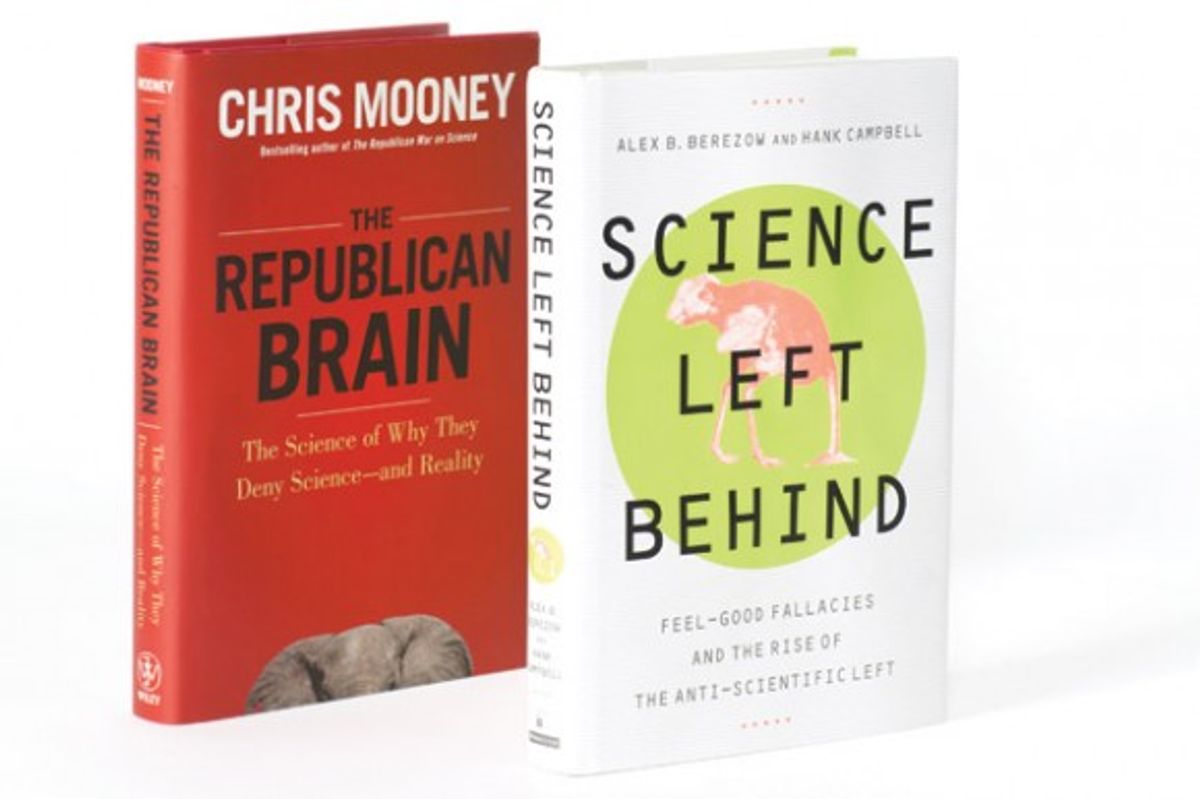 Any book that touches upon politics almost automatically angers half of the American public, regardless of what is written inside of it. It takes a special person—an objective, open-minded and self-critical one—to read and learn from a science book that criticizes people with whom the reader likes and agrees with politically.
Any book that touches upon politics almost automatically angers half of the American public, regardless of what is written inside of it. It takes a special person—an objective, open-minded and self-critical one—to read and learn from a science book that criticizes people with whom the reader likes and agrees with politically.
Recently, Pacific Standard published a review (“Red Science, Blue Science,”January/February 2013) by Wray Herbert, a pop psychology writer,of political writer Chris Mooney’s book The Republican Brain and my new book, Science Left Behind, which I co-authored with Hank Campbell.
Herbert fawned over Mooney’s book, the primary thrust of which is that psychology, neuroscience, and genetics explain why Republicans are “smart idiots” and reality deniers. Herbert found Mooney’s book “convincing,” despite the fact that few (if any) scientists would agree. In fact, Mooney’s main premise has been roundly debunked as pseudoscientific nonsense by a neuroscientist, a biochemist, and high-profile evolutionary biologist Jerry Coyne. As described in the New York Times, such critics resent the “bastardization [of neuroscience] by glib, sometimes ill-informed, popularizers.”
Similarly, our book makes the point—among many others—that such politicization of science illustrates everything that is wrong with modern science journalism. In our chapter “The Death of Science Journalism,” we discuss how too many science writers have morphed into cheerleaders who uncritically embrace progressive political causes at the expense of good science. For these writers, science isn’t about uncovering the wonders of the natural world; instead, it’s just another platform from which to bash and demonize political opponents. We believe such journalistic malpractice epitomizes science writing at its absolute worst.
Therefore, it is not a surprise that Herbert—who clearly sympathizes with Mooney’s career-long vendetta against Republicans—would find our book “petty” and “small-minded.” His emotional response indicates nothing more than his displeasure that our book criticized writers like him.
My co-author and I clearly possess a very different science writing philosophy. We believe in order for science journalism to thrive, it must primarily focus on reporting science, not politics. And most importantly, writers should be as objective as possible, fighting for Team Science instead of dedicating their careers to promoting Team Red or Team Blue.
In partial fulfillment of this mission, we chose to address an enormous myth that circulates in our media culture; namely, the idea that conservatives are uniquely anti-science and progressives are uniquely pro-science. Nothing could be further from reality.
It is certainly true that some conservatives embrace anti-scientific beliefs, most notably on evolution and climate change. But some progressives also adhere to a set of dangerous anti-scientific beliefs.
For instance, the destructive anti-vaccine movement has a long association with the progressive left. To deny that is simply to ignore history. The progressive outlet Huffington Post, where Mr. Herbert now writes, is regularly mocked in the scientific community for advancing anti-vaccine propaganda and embracing alternative medicine.
Furthermore, in 2005, Robert F. Kennedy, Jr. infamously wrote an article for Rolling Stone and Salon (since retracted) that erroneously linked vaccines to autism, a claim that, even then, had been thoroughly debunked by the scientific establishment. In 2008, while on the campaign trail, Sen. Barack Obama repeated the myth, and as president in 2009, his administration’s pandering to the anti-vaccine crowd was partially to blame for the H1N1 influenza vaccine shortage that occurred later that year. To this day, influential progressive commentator Bill Maher regularly spouts anti-vaccine and anti-Western medicine paranoia on his television program.
But this is just the tip of the proverbial iceberg. Scientists see water fluoridation, which particularly benefits the poor, as a major public health triumph. But not progressive activists in Portland, Oregon, who fought to prevent the fluoridation of their city’s water supply.
Mainstream progressive environmental groups such as Greenpeace and the Union of Concerned Scientists also oppose genetic modification, despite its tremendous life-saving potential in areas such as preventing vitamin A deficiency, a disease that blinds 250,000 to 500,000 children every year and kills half of them. The California Democratic Party, in direct opposition to the American Medical Association and the American Association for the Advancement of Science, endorsed that state’s Proposition 37, a referendum that would have unscientifically required the labeling of genetically modified food.
Despite the fact that thousands of deaths in the U.S. are attributable to the pollution produced by burning fossil fuels each year, progressives oppose energy policies that could reduce our dependency on coal and oil. Progressives historically have been anti-nuclear power, and today, they are opposed to natural gas, a much cleaner fossil fuel. Instead, they embrace wind and solar, neither of which are currently capable of meeting the world’s growing energy demand.
Public health, biotechnology and energy directly impact our lives and livelihoods, and they represent just a few of the important topics we address in our book. As we demonstrate, progressives routinely come down on the wrong side of those and other issues.
Anyone who is willing to take off his partisan glasses will quickly come to the conclusion that both sides of the political spectrum—conservatives and progressives—are willing to throw science under the bus whenever it is politically expedient.
It’s too bad that some members of the allegedly “watchdog” media are too blinded by their own partisan affiliations to do their jobs properly.



Shares